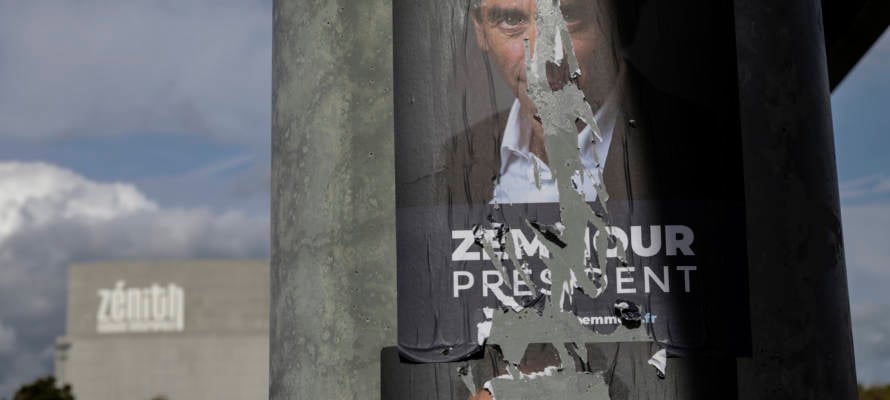“These traditions are linked to Judaism”: French far-Left leader Mélenchon offers bizarre defense of far-Right pundit over charge of antisemitism.
The leader of France’s main far-left political party was embroiled in a new controversy involving antisemitism over the weekend, following a television interview in which he depicted Judaism as a xenophobic culture impervious to change while answering a question about the far-right.
The context for the widely panned remarks of Jean-Luc Mélenchon — head of the La France Insoumise (“France Rising,” or LFI) party — was a segment of his Thursday morning interview on BFMTV dealing with the potential presidential candidacy of Eric Zemmour, a far-right television pundit and columnist who has himself been accused of antisemitism.
Asked whether he personally considered Zemmour, who is Jewish, to be antisemitic, Mélenchon demurred by holding up Judaism as the intellectual basis for Zemmour’s anti-immigrant, homophobic and ultranationalist platform.
“Mr. Zemmour cannot be antisemitic because he reproduces many cultural themes: ‘We do not change tradition, we do not evolve, creolization, my god, what a horror,’” Mélenchon argued.
“All these tradition are very much linked to Judaism,” he continued.
He then added: “It has its merits, it enabled [Judaism] to survive throughout history.”
Mélenchon’s comments drew outrage from several French politicians and commentators on social media.
“With these words, with the most abject references, [Mélenchon] finally crossed the line,” said Christophe Castaner, the leader of the ruling LREM Party’s grouping in the French parliament. “Nothing ever justifies sinking into antisemitism.”
“No, Jean-Luc Mélenchon, racism, Holocaust denial, sexism and Pétainism — this hatred of the other that Zemmour professes obsessively — are in no way Jewish traditions,” declared Edwy Plenel, a prominent political journalist.
“Mélenchon absolves Zemmour of antisemitism to make it an illustration of the Jewish tradition!?” said Patrick Klugman, a lawyer and former parliamentary deputy for the Socialist Party (PS). “One extremism never fixes another. It makes it worse. Here and on [the matter of] antisemitism, he spreads it.”
The International League Against Racism and Antisemitism (LICRA) — a Paris-based organization that counters antisemitism through the French courts — offered a wryly humorous response, with a mock official announcement on Twitter stating that Mélenchon had been appointed “head of the Museum of Antisemitic Arts and Traditions.”
In a response on his Facebook page over the weekend, Mélenchon shrugged off his critics while conceding that he had not expressed himself well.
“I have since been credited with locating the origin of Zemmour’s far-right ideas in Judaism. It’s stupidity!” he wrote, before admitting that he had expressed himself “poorly” as his words had given rise “to interpretations that are the opposite of what I think.”
Last week’s interview was not the first time that Mélenchon, who won nearly 20 percent of the vote in France’s 2017 presidential election, was accused of antisemitism.
In June 2020, he dismissed reports of chants of “Dirty Jews!” at a left-wing demonstration in Paris as having been fabricated by the police, who were guilty of “peddling gossip about antisemitism,” he said.
In a radio interview the following month, when asked if police should “be like Jesus on the cross and not respond” to violent demonstrators, Mélenchon revived the ancient antisemitic trope that Jews are collectively responsible for the execution of Jesus by the Romans by replying, “Listen, I don’t know if Jesus was on the cross. I know who put him there, it seems that it was his own compatriots.”
Mélenchon’s view of Zemmour as untainted by antisemitism is not shared by French Jewish leaders, who have called on their community to shun any overtures the TV pundit might be tempted to make should he decide to run in the April 2022 French presidential election.
Asked in a television interview last week whether he thought Zemmour was a racist, Haïm Korsia — the Chief Rabbi of France — answered: “An antisemite certainly, a racist obviously.”
Separately, Francis Kalifat — head of CRIF, the Jewish community’s umbrella body — urged that “no Jewish voice should support any Zemmour candidacy.”
Kalifat and other Jewish leaders were recently infuriated after Zemmour questioned where the true loyalties of French Jews murdered by an Islamist terrorist lay.
The four victims of jihadist gunman Mohamed Merah’s March 2012 attack on a Jewish school in Toulouse — Rabbi Jonathan Sandler, his two sons, six-year-old Arieh and three-year-old Gabriel, and another little girl, eight-year-old Miriam Monsonégo — were buried in Israel because “they were foreigners above all and wanted to stay that way even beyond death,” Zemmour said in a September television interview.
Zemmour has also sparked criticism by claiming with scant evidence that the World War II-era Vichy regime of Marshal Philippe Pétain acted to save French-born Jews from the clutches of the Nazis by prioritizing Jews holding foreign citizenship for deportation. The notorious “Status of the Jews Law” enacted by the Vichy authorities in Oct. 1940, which helped prepare the ground for the extermination of 75,000 French Jews during the Holocaust, did not differentiate between French-born Jews and those born abroad.
